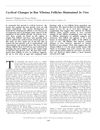 7 citations,
June 2022 in “Frontiers in Veterinary Science”
7 citations,
June 2022 in “Frontiers in Veterinary Science” Researchers found genes linked to hair growth cycles in Inner Mongolia cashmere goats, which could help understand and treat hair loss.
 5 citations,
March 2017 in “Biomedical and Pharmacology Journal”
5 citations,
March 2017 in “Biomedical and Pharmacology Journal” Certain growth factors significantly affect hair loss in women with telogen effluvium.
 4 citations,
October 2022 in “Journal of family medicine and primary care”
4 citations,
October 2022 in “Journal of family medicine and primary care” Some people in Saudi Arabia experienced hair loss after the COVID-19 vaccine, more often in women and those without prior hair loss.
 3 citations,
April 2022 in “Clinical, Cosmetic and Investigational Dermatology”
3 citations,
April 2022 in “Clinical, Cosmetic and Investigational Dermatology” Different methods, including stress management, healthy diet, supplements, and treatments like minoxidil, can help hair grow back after COVID-19 related hair loss.
 1 citations,
January 2019 in “Turk Dermatoloji Dergisi”
1 citations,
January 2019 in “Turk Dermatoloji Dergisi” Oxidative stress is likely important in causing telogen effluvium, and antioxidants might help treat it.
 August 2024 in “Journal of Cosmetic Dermatology”
August 2024 in “Journal of Cosmetic Dermatology” Telogen effluvium is linked to deficiencies in iron, vitamin B12, and thyroid function.
 March 2024 in “CRC Press eBooks”
March 2024 in “CRC Press eBooks” Telogen effluvium is a type of hair loss where more hair than normal falls out after stress or illness.
 November 2023 in “Stem cells and cloning”
November 2023 in “Stem cells and cloning” A new treatment using stem cell-conditioned media significantly improved hair growth in people with temporary hair loss.
 April 2023 in “The journal of investigative dermatology/Journal of investigative dermatology”
April 2023 in “The journal of investigative dermatology/Journal of investigative dermatology” Derinat helps extend hair growth by reducing harmful molecules in skin cells.
 January 2023 in “Clinical dermatology review”
January 2023 in “Clinical dermatology review” COVID-19 infection may cause hair loss.
 November 2001 in “CRC Press eBooks”
November 2001 in “CRC Press eBooks” Hair loss from telogen effluvium happens when a disturbance or imbalance causes hair to fall out prematurely.
 January 1998 in “Jaypee Brothers Medical Publishers (P) Ltd. eBooks”
January 1998 in “Jaypee Brothers Medical Publishers (P) Ltd. eBooks” Telogen effluvium is a condition that causes temporary hair loss due to stress or shock to the body.
94 citations,
July 2003 in “Journal of biological chemistry/The Journal of biological chemistry” EGF controls hair growth by regulating hair follicles' growth phases.
92 citations,
November 2006 in “Proceedings of the National Academy of Sciences of the United States of America” BMP signaling controls hair follicle size and cell growth by affecting cell cycle genes.
36 citations,
October 2015 in “Cell reports” Gab1 protein is crucial for hair growth and stem cell renewal, and Mapk signaling helps maintain these processes.
 34 citations,
December 2000 in “The journal of investigative dermatology/Journal of investigative dermatology”
34 citations,
December 2000 in “The journal of investigative dermatology/Journal of investigative dermatology” Rat vibrissa follicles are useful for studying hair growth cycles, especially the transition from pro-anagen to anagen.
 31 citations,
May 2020 in “Dermatologic Therapy”
31 citations,
May 2020 in “Dermatologic Therapy” Quarantine stress likely worsened hair loss in women, but video consultations helped manage their condition and reduce anxiety.
 25 citations,
August 2021 in “Irish Journal of Medical Science (1971 -)”
25 citations,
August 2021 in “Irish Journal of Medical Science (1971 -)” COVID-19 infection can significantly cause temporary hair loss.
 22 citations,
December 2014 in “Naunyn-Schmiedeberg's Archives of Pharmacology”
22 citations,
December 2014 in “Naunyn-Schmiedeberg's Archives of Pharmacology” Baicalin helps hair grow by boosting certain cell activities and speeding up hair cycle in mice.
 19 citations,
January 2019 in “International Journal of Trichology”
19 citations,
January 2019 in “International Journal of Trichology” Indian dermatologists recommend treating common hair loss with a balanced diet, stress reduction, mild shampoos, and sometimes minoxidil and supplements.
 18 citations,
October 2017 in “PLOS ONE”
18 citations,
October 2017 in “PLOS ONE” The study concluded that similar pathways regulate hair growth in dogs and mice, and these pathways are disrupted in dogs with Alopecia X, affecting stem cells and hormone metabolism.
18 citations,
November 1998 in “Comparative biochemistry and physiology. Part A, Molecular & integrative physiology” Changes in prolactin and DHEA levels are not required for the start of mink hair growth cycles.
 14 citations,
December 2003 in “International Journal of Cosmetic Science”
14 citations,
December 2003 in “International Journal of Cosmetic Science” Hair growth and shedding are linked and can be disrupted, causing a delay known as the hair eclipse phenomenon, which is common in certain hair conditions and could lead to new treatments.
5 citations,
March 2022 in “Frontiers in Cell and Developmental Biology” Colostrum-derived exosomes can promote hair growth and may be a promising treatment for hair loss.
 5 citations,
December 2021 in “Journal of Cosmetic Dermatology”
5 citations,
December 2021 in “Journal of Cosmetic Dermatology” QR678 Neo® hair growth treatment is effective for hair loss caused by Covid-19.
 3 citations,
April 2021 in “Revista da Sociedade Portuguesa de Dermatologia e Venereologia”
3 citations,
April 2021 in “Revista da Sociedade Portuguesa de Dermatologia e Venereologia” Some people who got COVID-19 experienced temporary hair loss starting around 10 weeks after infection, with many seeing improvement within about 25 days.
 2 citations,
July 2023 in “Life”
2 citations,
July 2023 in “Life” COVID-19 can cause temporary hair loss, which is commonly reversible with treatment.
 2 citations,
July 2023 in “Journal of Cosmetic Dermatology”
2 citations,
July 2023 in “Journal of Cosmetic Dermatology” The topical treatment reduced hair loss and improved hair growth in patients with certain types of hair loss.
 2 citations,
March 2020 in “PubMed”
2 citations,
March 2020 in “PubMed” Biotin deficiency is not a major cause of Telogen Effluvium hair loss.
 1 citations,
October 2021 in “Journal of the European Academy of Dermatology and Venereology”
1 citations,
October 2021 in “Journal of the European Academy of Dermatology and Venereology” The hair lotion reduced hair loss and sped up recovery in women with acute telogen effluvium.
























